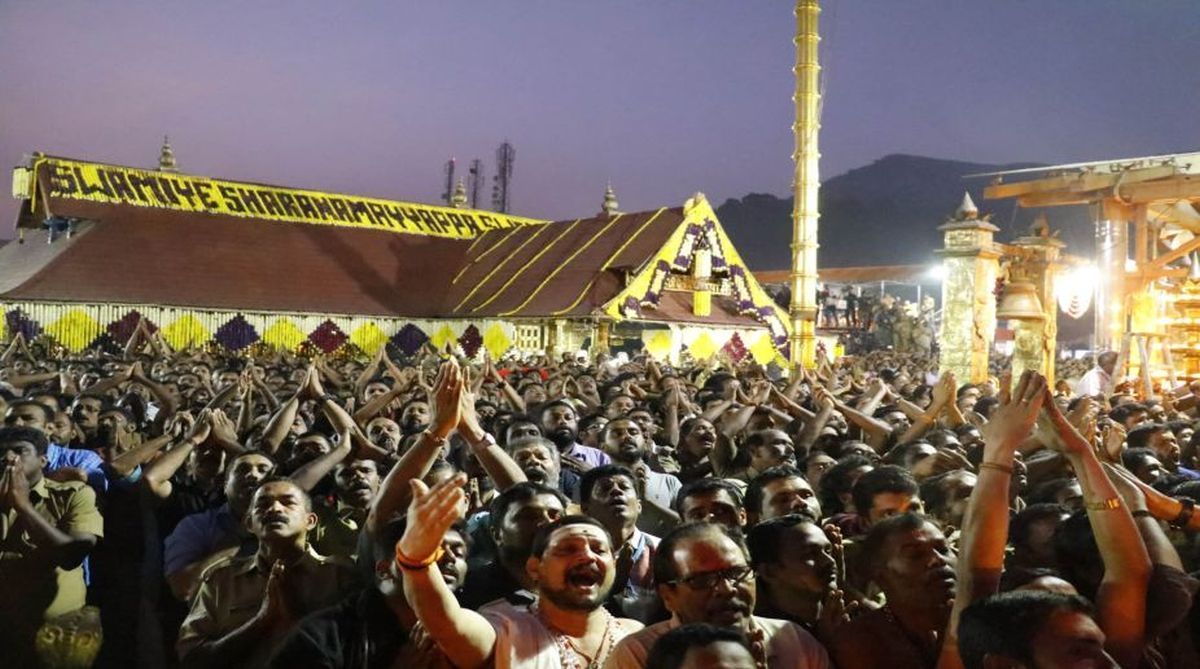Investors coming to Kerala need not worry about red tape: Kerala CM
Kerala Chief Minister Pinarayi Vijayan said on Friday that investors coming to Kerala need not worry about red tape.
A five-judge Constitution Bench headed by the then Chief Justice Misra had on September 28 last year junked the age-old tradition of the Lord Ayyappa temple by a majority verdict of 4:1.

Devotees at Sabarimala temple (Photo: IANS)
In a complete turnaround from its earlier stand that women aged between 10 and 50 should not be allowed inside the Sabarimala temple, the Travancore Dewasom Board, on Tuesday opposed the review and told the Supreme Court that it wants the verdict allowing women of all ages to stay.
“Everyone is entitled to enter the temple. Any practice has to be dominant with the view of equality,” the board said adding “We have to move and transform the society to include women in all walks of life”.
Advertisement
“We have taken a decision to respect the judgement,” the board added.
Advertisement
It is an essential part of the Hindu religion to allow women to enter the temple, the temple board said.
Following the temple board’s U-turn in the matter, Justice Justice Indu Malhotra said, “There is a complete change of stand by the Travancore Dewasom Board”.
Justice Indu Malhotra had presented a dissenting opinion on the Supreme Court’s September verdict saying, “the court should not interfere in matters of faith”.
Advocate Indira Jaising arguing for women rights said that “purification ceremony being held affirms that menstruating women are considered polluted”.
“Social boycott going on against the women who entered the temple,” she added.
She further asserted that women should be allowed to enter the temple which is set to open on February 12.
The apex court has reserved its verdict on the matter.
Several organisations including the Nair Service Society and the Thantri of the Sabarimala temple had earlier in the day advanced arguments before the bench and sought reconsideration of the verdict.
Senior advocate K Parasaran appearing for the Nair Service Society told the court that “the exclusionary practice in Sabarimala is based on the character of the deity”.
The petitioners also argued that “Sabarimala custom cannot be equated to untouchability. It is only a religious custom”.
Abhishek Manu Singhvi appearing for ex-Chairman of the Devaswom Board argued before the court that “untouchability will not be applicable as it is not a caste or religion-based exclusion. There is no exclusion of men and women, but only exclusion for a class of women.”
The Supreme Court, in its September judgement, had said the practice is akin to untouchability.
Read | Supreme Court scraps Sabarimala temple ban on entry of women
Senior Advocate Nafade argued that “religion was a matter of faith and only community can decide the custom, not the court”.
“As long as the community decides not to change the practice, the Supreme Court cannot intervene,” he said.
The Chief Justice also allowed 90 minutes to those supporting the Supreme Court verdict.
Jaideep Gupta, arguing for the Kerala state said that there was no need to review the verdict.
Opposing the review, the government said there was also a consensus of judges on three issues – First, that Sabarimala is not a denominational temple, second, that a person’s right to worship in a temple is taken away for a major part of her life, and third, that the rule violated the act governing the temples itself.
The government further submitted that only if it is a denominational temple, the question of essential practice arises.
“Jagannath temple is unique in its practice and yet this court has held it’s not a denominational temple… similarly Kashi Vishwanath and Tirupati have been said not to be denominational,” it said.
The 65 petitions including 56 review petitions and four fresh writ petitions are being heard by a Constitution bench comprising Chief Justice Ranjan Gogoi and Justices RF Nariman, AM Khanwilkar, DY Chandrachud and Indu Malhotra.
The petitions were earlier scheduled to be heard on January 22 but were postponed since Justice Indu Malhotra went on medical leave.
On November 13, in a rare instance, the Supreme Court decided to go for open court hearing of the petitions seeking a recall of its order permitting women of all age groups to pray at the Sabarimala temple.
Read | SC agrees to reconsider Sabarimala temple verdict in open court on Jan 22
The Lord Ayyappa temple has since then witnessed massive protests by various devotee groups and Hindu outfits against the Pinarayi Vijayan government’s decision to implement the apex court order without going for any review petition.
Only two women — Bindu and Kanakadurga — managed to enter the temple in the wee hours of January 2 with tight police security.
Though many attempts were made by some young women, to enter the temple of the ‘Naishtik Brahmachari’, the eternally celibate deity, the devotees backed by priests stood their ground, saying they would not allow the tradition to be breached.
The temple remains open only for 127 days in a year.
A five-judge Constitution Bench headed by the then Chief Justice Misra had on September 28 last year junked the age-old tradition of the Lord Ayyappa temple by a majority verdict of 4:1.
“Right to worship is given to all devotees and there can be no discrimination on the basis of gender,” former chief justice Dipak Misra had observed.
Advertisement